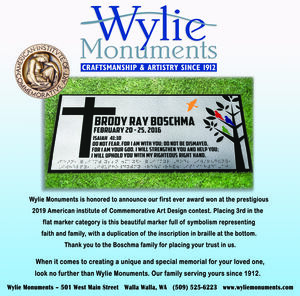The Owl
Just Vignettes by Popo Ott
April 13, 2023
I call this series "Just Vignettes" because that's what they are, just short snapshots of things that have happened to me or have been told to me. I can vouch the stories you read here are mostly true.
The USS San Jose had tall hydraulic rams with wheels, cable guides, and wire rope, all heavily greased with black, sticky grease. This grease could entrap unfortunate birds who come in contact with it. Steaming off the coast of Oman near Masirah Island, the stiff westerlies carried a little owl to that fate.
The sailors responsible for the rig brought me the owl to see if I could save it. I was warned that owls have a nasty bite and I should wear gloves. The owl had only a few clumps of grease on it, probably just enough to prevent it from flying. I thought I could wipe the residue off sufficiently to release the owl the next time we were within sight of land.
The owl submitted to the indignity of being cleaned, did not struggle, and never attempted to bite.
The owl, who we never named, soon appeared to recover. The owl stayed on my shoulder throughout most of the day. It would sometimes take to wing in my stateroom, making graceful and swift circles around it, sometimes crying, "Kew, Kew, Kew." The flight was silent; its flapping wings could not be heard. The owl would return to my shoulder or sometimes perch in the overhead ducts.
The captain seemed amused by the ship's owl, and most of the crew seemed enthralled. I never saw anyone aboard see the owl and not smile. The ship's cooks brought up small pieces of raw beef to try and feed the owl; it would not eat. Other crew members caught small insects; the owl would not eat. We offered it water, but it would not drink.
Attempts to provide the owl sustenance went on for days, but nothing worked. During this time, the owl seemed active and alert while it made new friends with the crew.
Our ship remained hundreds of miles from shore, and we never seemed to get an opportunity to release it back to the wild.
One day, just before I was to go on watch, I noticed the owl seemed to be in distress. I brought it to the chaplain's stateroom, and we called sickbay. As I left the owl to begin my watch on the bridge, the owl had two corpsmen and a chaplain attempting to revive it. About an hour later, I received the call telling me the owl had died.
Its body was placed in a small box cushioned with red tissue paper. The ship's captain agreed to allow the chaplain to conduct a burial at sea according to naval tradition.
The bos'n piped the crew to attention on the 1MC general announcing system and formally announced, "All hands bury the dead....owl." The "owl" part was, of course, non-traditional.
A few dozen crew gathered on the ship's fantail. The chaplain began the customary service for burial at sea of crew members, making appropriate changes to better suit the ceremony for an owl.
He closed with a prayer similar to, "Lord God, by the power of your Word you stilled the chaos of the primeval seas, you made the raging waters of the Flood subside, and you calmed the storm on the Sea of Galilee. As we commit the earthly remains of our owl to the deep, grant it peace and tranquility..."
The chaplain then tossed the casket into the sea behind the ship.
The bird's little casket drifted behind in the San Jose's wake and began to sink as it disappeared from our sight in the choppy seas. It was an honor for the owl to have graced us with its last few days, and I was thankful that it brought some joy and companionship during a long North Arabian Sea patrol. Goodbye, little owl, fair winds, and following seas.








Reader Comments(0)